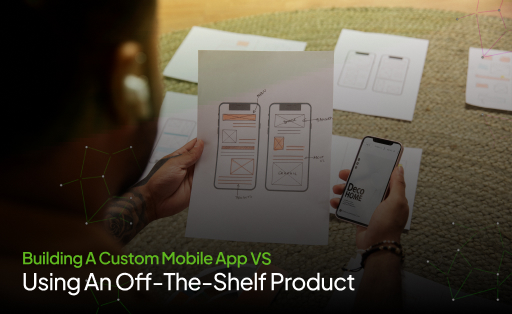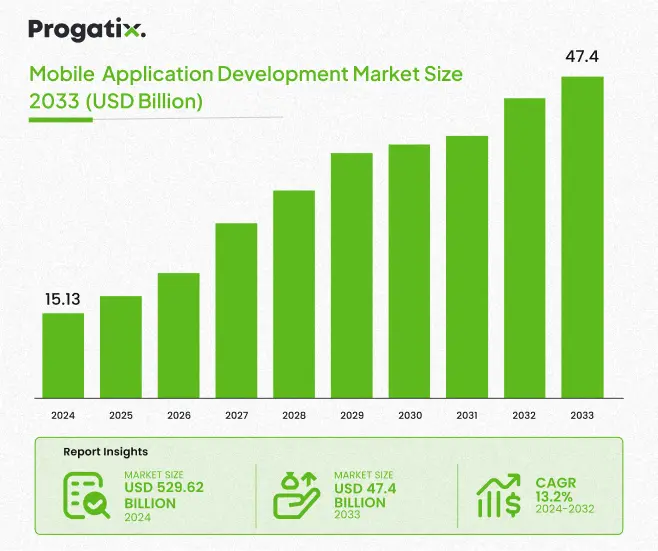Building A Custom Mobile App VS. Using An Off-The-Shelf Product App Development

Numerous businesses face challenges when choosing software solutions that could improve their operations, simplify processes, and support growth. One such choice is among custom-built apps and off-the-shelf apps. Choosing an app development partner or hiring a software developer and going solo is a challenging decision. The right decision could have a profound impact on efficiency, long-term success, and customer engagement.
This blog will define the key differences between bespoke mobile apps and off-the-shelf apps, providing insights into which option is better for which business as per their specific requirements. To add detail, real-world instances and practical considerations are included throughout the discussion.
Mobile Applications Global Market Size
According to the grandviewresearch’s report, the global mobile application market size was estimated at USD 252.89 billion in 2023 and is anticipated to grow at a compound annual growth rate (CAGR) of 14.3% from 2024 to 2030.
What are Custom Apps?
Custom mobile app development refers to a process of creating software particularly designed to meet the needs of a business, using frameworks such as React Native. Custom apps are personalized to meet specific business goals, challenges, and workflows, providing a highly bespoke approach to app development. React Native, a well-known open-source framework generated by Facebook, allows businesses to develop high-performance apps that work throughout numerous platforms, whether iOS or Android, using a single codebase. This considerably cut development costs and time while keeping the bespoke nature of customer software.
React Native is especially valuable in custom software development because it enables developers to build mobile apps that deliver a smooth user experience parallel to native apps without requiring them to write separate code for diverse operating systems. Businesses can ensure that the product is personalized to their specific demands by collaborating closely with a mobile app development company or a specialized development team. This will result in a unique app that not only satisfies their unique requirements but also takes advantage of the effectiveness and adaptability of cross-platform development.
For example, consider a globally known retail company such as Walmart, which needs a custom-built app to handle its huge inventory systems, track customer preferences, and optimize supply chain logistics. By using React Native for its mobile app development, Walmart can create potential, scalable works throughout several platforms, ensuring unchanging functionality for both Android and iOS users. React Native’s ability to incorporate existing internal systems and third-party APIs makes sure that the app fits precisely into Walmart’s complex operational infrastructure, delivering real-time updates, tracking, and system-wide efficiencies. This approach offers all the benefits of custom software while also optimizing the development process, decreasing time to market, and allowing the adaptability to scale and transform the app as the company’s requirements develop.
Benefits of Custom Apps
-
Competitive Edge
Custom apps solve certain business needs and issues, offering them a competitive edge. They can provide more accurate, effective, and innovative solutions than off-the-shelf software since they are made to fulfill certain business goals. This can be a significant benefit in fields where individuality is crucial.
-
Integration with Existing Systems
Custom apps could be smoothly integrated with existing internal systems, improving departmental association and enhancing overall productivity. By creating a unified platform, businesses could simplify workflows and decrease redundancies while ensuring smooth data flow between several systems.
-
Data Security
Custom-built apps provide greater control over data security. Businesses could execute strong security protocols personalized to their industry’s standards, ensuring that crucial details are secured from possible breaches. In industries such as healthcare or fiancé, where data safety is significant, custom solutions provide a level of security that off-the-shelf products might not align with.
-
Future Adaptability
Custom applications might be built with future company expansion in mind, ensuring scalability, or they could be upgraded to meet evolving customer needs and technological advancements. Because of this, companies don’t have to worry about constraints or growing their software as their operations evolve.
Limitations of Custom Apps
-
Higher Initial Investment
The cost of custom development could be forbidden for small businesses. It requires essential resources and time to build, which is not practical for businesses with small or restricted budgets.
-
Constant Maintenance
Once a custom app is built, it needs continuous maintenance and updates to keep it working ideally, adding to the overall cost of ownership, as businesses must allocate resources for enduring support and updates.
-
Extended Development Time
Custom apps take longer to develop when compared to off-the-shelf solutions. From defining needs to testing and deployment, businesses must be ready to invest time throughout the development process.
Common Use Cases
- Enterprise Resource Planning (ERP) systems that simplify internal operations
- Proprietary solutions for agencies and SaaS providers pursuing market diversity
- eCommerce platforms with optimized inventory and tailored user experiences
- Healthcare and financial applications demanding robust security compliance
What are off-the-shelf apps?
On the contrary, off-the-shelf apps, also known as off-the-shelf software/solutions, refer to the pre-built software applications built for a wide range of users. These commercial software solutions come with a standard set of features and are readily available for deployment without needing considerable customization. Instances of popular off-the-shelf applications comprise Microsoft Office, QuickBooks, and Salesforce.
These applications are broadly used because they are reasonable, can be rapidly executed, and offer scalability for businesses that do not need highly personalized features. For instance, a small e-commerce company seeking to handle its accounting methods may choose QuickBooks, a strong off-the-shelf solution that meets most of its requirements, compared to investing in a custom-built app with bespoke accounting features.
Benefits of Off-the-Shelf Apps
-
Quick Deployment
For businesses that require a rapid solution, off-the-shelf is perfect. They are willingly available and could be deployed with minimal setup time. This is specifically practical for startups or small businesses that need to get operational fast.
-
Cost-Efficient
Off-the-shelf apps are usually more reasonable than custom solutions. Businesses could begin using the software rapidly without the requirement for a considerable upfront investment, making them a practical choice for companies with restricted budgets.
-
Proven Reliability
Numerous off-the-shelf apps have been tested and proven throughout several industries. They have a huge user base and extensive documentation, making them trustworthy and well-supported. Companies can leverage frequent updates and community support, ensuring that the software stays up-to-date and operational.
-
Broad Functionality
Off-the-shelf solutions normally have wide-ranging standard features that could meet most of the requirements of the businesses. These features are made to fulfill a huge audience base, making the software adaptable and adept enough to manage a number of tasks.
Elevate Your Vision—Build A Custom App With Us Today!
Let's ConnectLimitations of Off-the-Shelf Apps
-
Restricted Personalization
Off-the-shelf apps might not completely meet a business’s particular requirements, particularly if the company needs unique features or integrations. Businesses might have to compromise or find workarounds to fit their processes into the app’s restrictions.
-
Vendor Dependency
Businesses using off-the-shelf solutions rely on the vendor for updates and new features. It could be frustrating if the software fails to develop quickly enough to meet the changing requirements of the business.
-
Scalability Issues
While many off-the-shelf solutions provide scalability, they might not be able to help with quick growth or complex business goals. Businesses that expand their off-the-shelf app might need to evolve to a custom solution, resulting in additional costs and interruption.
Examples of Common Off-the-Shelf Solutions
- Salesforce:(CRM) for customer relationship management.
- Shopify: (eCommerce) is an available platform for online retailers.
- Microsoft 365: (collaboration) for productivity tools that run on the cloud.
- Quick Books: (accounting) for financial reporting and tax compliance.
Key Differences Between Custom and Off-the-Shelf Apps
-
Customization
Customization is perhaps the most important difference among custom apps and off-the-shelf apps. Custom apps are built for the specific challenges businesses face. Every feature is personalized to meet the specific business processes and needs, providing a high degree of personalization. For example, a custom mobile app built for a logistics company could integrate specialized features, including real-time GPS tracking, automated invoicing, and route optimization, to simplify its delivery services.
On the contrary, off-the-shelf software offers generic solutions with restricted personalization choices. While these apps are functional for general use cases, they might not solve niche demands, leading to businesses adapting their processes to fit the app’s features instead of having an app that adjusts to their processes.
-
Deployment Time
Deployment time is another important factor to consider. Off-the-shelf apps deliver a quick solution for businesses that need to get up and work quickly. Since these apps are pre-built, they need minimal setup and could be executed within days or weeks, based on the system’s complexity.
Custom apps, however, need a longer development process. Based on the app’s complexity, the design, development, testing, and deployment phases could take numerous months. However, the end result is a completely personalized app built particularly for the company’s requirements.
Uber is an example of this. When the company was first introduced, it required a custom mobile app to manage ride bookings, driver management, and payment processing. Building such an app needs a considerable time investment, but it is crucial for offering the unique features and real-time functionality that Uber needs to distinguish itself from competitors.
-
Scalability
Custom apps are highly scalable. They can be easily expanded or adapted as a firm expands because they are designed particularly to meet its present and future demands. Custom solutions tend to be preferred by businesses that intend to grow quickly or whose demands will change over time due to their scalability.
Off-the-shelf apps might not provide a small level of flexibility. While numerous commercial software products offer scalable options, they might not be able to manage complex business goals or unique business processes without needing extensive personalization or extra costs.
Amazon serves as an excellent example of scalability in custom applications. The business can extend operations globally and manage millions of transactions and deliveries every day due to its in-house logistics software and mobile apps. The volume and complexity required for Amazon’s operations would have been too much for off-the-shelf technologies to deal with.
-
Ownership and Control
When businesses choose a custom app, they have complete ownership of the software, including the whole management of the app’s features, source code, and updates. They could modify the app as required to adjust to new business requirements or technological enhancements.
On the other hand, companies rely on the vendor for updates and feature improvements when using off-the-shelf software. They have to follow the vendor’s product plan and do not possess the source code. Businesses that need to innovate or swiftly adapt to changes in the market could find this to be limiting.
A company using Shopify, an off-the-shelf e-commerce platform, for instance, must pause for Shopify’s updates and new features. If the platform doesn’t offer the required functionality, the business might have to either build a custom solution or find third-party plugins to fill the gap.
-
Cost
Custom apps usually have a larger initial investment compared to off-the-shelf apps. Developing bespoke software needs large-scale collaboration with a mobile app development company, coding from scratch, quality assurance testing, and continuous maintenance. While the upfront costs are higher, businesses have the whole ownership of the source code and can adjust the app as per the changed requirements over time.
In contrast, off-the-shelf options are less expensive upfront. App development expenses vary among numerous users because these apps have been built for mass-market use. Companies can begin using the program right away after paying for licensing or subscription costs. However, often, the early savings are exceeded by the cost of ongoing customization or scaling the solution to meet expanding business requirements.
For example, a startup may start using Salesforce, a hugely used off-the-shelf customer relationship management (CRM) system, because it provides a cost-efficient and quick-to-deploy solution. However, as the business develops, it could face extra costs for premium features, customization, or scaling the solution to manage higher volumes of data and customer interactions.
Custom Apps vs. Off-the-Shelf Apps: which one to choose
Choosing between custom apps and off-the-shelf software relies on your business’s specific requirements, budget, and long-term objectives. Custom apps offer a personalized solution designed to meet unique business needs and workflows, making them perfect for industries including healthcare, finance, or logistics, where security, scalability, and integration are significant. However, they come with an advanced initial investment, extensive development times, and constant maintenance costs, making them less practicable for small businesses or startups with restricted budgets.
Off-the-shelf apps, alternatively, are cost-efficient and rapid to deploy, offering general functionality that works well for businesses with standard requirements. While they can be the right tool for startups or companies requiring a quick solution, off-the-shelf software might struggle to keep up with the growing demands of growing businesses, needing additional customization or a shift to a custom solution in the future. Eventually, businesses composed of prompt growth or with complex requirements should lean towards custom apps for their scalability, while smaller businesses or those requiring a quick, cost-effective solution can benefit from the ease of off-the-shelf apps.
Custom Apps vs. Off-the-Shelf Apps: Emerging Trends in 2025
The setting for business applications endures to develop, impacted by several key trends:
-
AI-Driven Automation
Custom apps progressively use AI for predictive analytics, automation, and personalization, offering businesses a strategic advantage.
-
Low-Code & No-Code Development
Off-the-shelf platforms include drag-and-drop customization, constricting the gap between custom and pre-built solutions.
-
Cybersecurity Prioritization
With increasing cyber threats, custom applications enable personalized security measures, while off-the-shelf solutions depend on vendor-managed compliance updates.
-
API Ecosystems & Integration Flexibility
Businesses looking for smooth integrations might lean toward custom development to escape third-party compatibility concerns.
Final Words
The decision to choose between custom apps and off-the-shelf apps is based on several factors, such as business requirements, budget, and long-term objectives. Custom apps offer a personalized solution that can offer a competitive edge, particularly for businesses with exceptional challenges or complex practices. Off-the-shelf apps, alternatively, are cost-efficient, easy to deploy, and adequate for numerous standard business operations.
Why Choose Progatix?
Progatix, a leading custom software and app development company, is proficient in using technologies like React Native and other innovative technologies that support our scalable, high-performing apps, which evolve with your company. We ensure to provide an app that meets existing requirements while adjusting for the future, reassuring long-term growth and success, whether you seek a personalized, cost-effective solution or an off-the-shelf solution.



 Let's Discuss Your Tech Solutions
Let's Discuss Your Tech Solutions 





